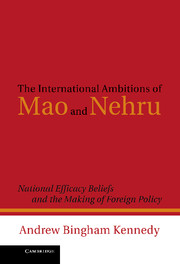 The International Ambitions of Mao and Nehru
The International Ambitions of Mao and Nehru 3 - Same Revolution, Different Dreams
Published online by Cambridge University Press: 05 January 2012
Summary
Revolution is not like inviting people to dinner, or writing an essay, or painting a picture, or doing embroidery.…A revolution is an uprising, an act of violence whereby one class overthrows the power of another.
Mao Zedong, February 1927On October 1, 1949, Mao Zedong proclaimed the founding of the People's Republic of China (PRC) while standing atop the Gate of Heavenly Peace in Beijing. Feverish and feeling ill, China's new leader did not try too hard to inspire his listeners with impressive oratory. Instead, he devoted most of his speech to reciting a long list of appointments in the forthcoming government. Yet if the rhetoric did not quite live up to the moment, Mao's announcement formally concluded four decades of political chaos and civil war following the collapse of the Qing dynasty in 1911.
Mao's path to power through this complex history had been tortuous in the extreme. He was born in 1893 in the remote Shaoshan Valley of Hunan province, nearly 1,000 miles from Beijing. Despite his rural upbringing, Mao acquired a taste for books and history as a boy, and in 1911 he moved to the provincial capital of Changsha to pursue his studies. A decade later, Mao joined the fledgling Chinese Communist Party (CCP), and attended its first congress in Shanghai in 1921. In the mid-1920s, Mao took part in the first “united front” between the CCP and the larger Nationalist Party, or Guomindang (GMD). When the two parties split violently in 1927, Mao took refuge in the Jinggang Mountains on the Hunan-Jiangxi border and later in the small soviet that the communists established in Jiangxi. In the mid-1930s, Mao and his comrades fled Jiangxi for northern China, settling in Yan'an at the end of the fabled “Long March.” Mao remained in Yan'an until 1947, surviving the war with Japan and consolidating his supremacy within the party. In the late 1940s, Mao led the CCP to a dramatic nationwide victory over Chiang Kai-shek's nationalists to take control of China.
- Type
- Chapter
- Information
- The International Ambitions of Mao and NehruNational Efficacy Beliefs and the Making of Foreign Policy, pp. 43 - 67Publisher: Cambridge University PressPrint publication year: 2011


